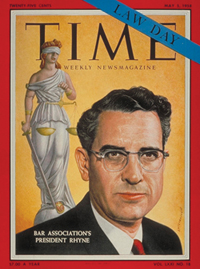Charlie Rhyne's Big Idea

Reprinted through the
courtesy of the editors of Time Magazine.
© Time, Inc.
Charles S. Rhyne would be proud to know that his big idea is still going strong. Rhyne is credited with originating Law Day, the annual event in which the ABA, state and local bar associations, schools and organizations in other fields commemorate the importance of the rule of law in a free society.
The world was a different place when the first Law Day was held. Rhyne, a 45-year-old Washington, D.C., lawyer who was legal counsel to President Eisenhower for a time, was serving in 1957-58 as the ABA’s youngest president to date. His relationship with the administration made it easier to get Eisenhower to issue a proclamation declaring May 1, 1958, as a day to commemorate the rule of law and freedom in the United States.
In a speech in 2000 at the Law Library of Congress, Rhyne explained why he had proposed the creation of Law Day.
“The immediate inspiration for a May 1 celebration of law was directly related to the Cold War,” said Rhyne, who died in 2003. “For many years, the American news media gave front-page headlines and pictures to the Soviet Union’s May Day parade of new war weapons. My idea was to contrast the United States’ reliance on the rule of law with the Soviet Union’s rule by force.”
Rhyne’s idea struck a chord. Time magazine even marked the first Law Day by featuring him on the cover of its issue for May 5, 1958.
But Rhyne recalled in his 2000 speech that Law Day almost was torpedoed by a misunderstanding among some of Eisenhower’s advisers.
While he was in the Oval Office going over the draft proclamation with Eisenhower, said Rhyne, White House Chief of Staff Sherman Adams “burst in yelling, ‘Do not sign that paper praising lawyers!’ ”
But Eisenhower “held up his hand for silence until he had read the entire document,” said Rhyne. “Then he said, ‘Sherm, this proclamation does not contain one word praising lawyers. It praises our constitutional system of government, our great heritage under the rule of law, and asks our people to stand up and praise what they have created. I like it, and I am going to sign it.’ ”
A HAPPY COINCIDENCE
Law Day has come full circle in the past 50 years. This year’s theme—“The Rule of Law: Foundation for Communities of Opportunity and Equity”—echoes Rhyne’s original celebration of universal principles of social justice and individual freedom, while at the same time reflecting the World Justice Project, the primary initiative of current ABA President William H. Neukom of Seattle.
The project is seeking to build a broad-based international consensus on rule of law principles, as well as quantitative measures of their importance in societies. In July, these issues will be discussed at the World Justice Forum that the ABA will host in Vienna, Austria.
The coincidence that 2008 marks the 50th Law Day “is a wonderful windfall from my point of view,” Neukom says. “I think the phrase rule of law is overused in a lot of ways, so this is a perfect opportunity to put some meaning back into the concept.”
The World Justice Project has been working for the past several months with organizations representing other disciplines to sponsor programs focusing on rule of law issues. Those efforts are continuing in conjunction with Law Day. The ABA Division for Public Education provides planning guidance to groups putting on Law Day events.
A half-century of Law Days has not lessened the need for programs that emphasize the importance of the rule of law, says H. William Allen of Little Rock, Ark., the ABA’s national Law Day chair for 2008.
“There seems to be a widespread misunderstanding of the role of an independent judiciary and a lack of education about the law,” says Allen. “Law Day is a perfect vehicle for fighting that problem.”
Web Extra:



